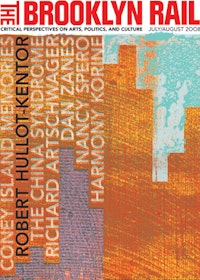Theater
A Play at Poolside: Caridad Svich's 12 Ophelias

Several months ago, Teddy Bergman got a unique script, 12 Ophelias (a play with broken songs), by Caridad Svich, from his friend Jocelyn Kuritsky. Ophelias is a series of scenes and songs in heightened language set, according to Svich, in a “timeless time,” depicting several characters from Hamlet in the aftermath of Ophelia’s suicide.
Bergman was intrigued by the piece. But as Artistic Director of the Woodshed Collective, whose mission includes the goal of creating “fully realized installation theater,” Bergman knew he had to find the right “site” for a site-specific production of 12 Ophelias.
When he learned about the possibility of producing the piece at McCarren Park Pool in Greenpoint, he jumped at the chance. The pool, one of a number of WPA-commissioned public park projects envisioned by Robert Moses in the 1930s, is a 4.5-foot deep concrete shell, with an area greater than a football field. When in use as a pool or, as Bergman describes it, an “urban beach,” the pool had a capacity of nearly 7,000 bathers at a time.
“Basically,” says Bergman, “the play is an image of Ophelia coming back out of the water to imagine how things could have gone differently for her.” The pool, he says, was “the only place we could have done the show…what was a symbol of womanhood has been drained.” The pool, which has hosted dance and concert events, has never before been a venue for drama.
It shouldn’t be too surprising that Woodshed and Svich found one another, as they share something of an artistic pedigree. Svich, a playwright-songwriter-translator-editor, (she recently published translations of two collections of Lorca’s works and edited a collection of contemporary adaptations of mythology) was mentored by Maria Irene Fornes for several years after graduating from UC San Diego’s Playwriting MFA program.
Fornes’s 1988 production of Hunger was done with Anne Hamburger’s En Garde Arts, the company whose mission of producing site-specific work Woodshed continues today. That production led audiences from room to room on the upper floors of a warehouse. Likewise, Part II of Fornes’s Fefu and Her Friends calls for an audience divided into four groups to move from room to room in a house in which scenes are taking place simultaneously, effectively challenging them to physically enter the world of the piece and construct their own implicitly subjective understanding of it.
Fornes would be right at home with Woodshed, whose mission calls for theater “that athleticizes our audience’s senses, emotions, and minds, challenging them to make choices and claim a presence that affects the experience itself.” Ophelias carries on Fornes’ site-specific tradition—following a workshop at Vassar College at which the piece was performed near a giant tree, Svich says, “being outdoors was always part of it.” When Bergman told her of the opportunity at the pool, she immediately said yes.
“The piece is full of images of swimming and being in the water…and I liked the image of a ruined place that retains vibrancy and life, with its own character and history,” says Svich. “Ophelia enters another world…a place that has its own history, that imposes another. One thing I like about the pool is that it is a place without water which was once embodied by water…it is surrounded by a life, a city, and another world.” Moreover, the magnitude of the setting gives Ophelia the “ability to travel,” which is appropriate, as one stage direction calls for her to walk for miles.
Svich set the piece in a “neo-Elizabethan Appalachia” that Bergman describes as “Denmark by way of Deliverance.” Given that setting, another benefit, Svich says, of the collaboration was the opportunity to have her songs arranged by the Jones Street Boys, a group of Brooklyn-based musicians with a bluegrass-infused style that Bergman calls “more The Band than Flatt and Scruggs.”
“I was thrilled by what can happen through their experience of the show,” says Svich.
Speaking with Svich, one gets the sense that this open dramaturgy, through which every collaborator’s individual experience of the piece finds its way into the process, is essential to how both Woodshed and Svich work. “Every character is Ophelia in some way,” she says.
This inclusive attitude dovetails nicely with Svich’s overall work as a playwright which, of late, has consisted of interpretations and reimaginations of figures from history and mythology. Her piece Iphigenia Crash Land Falls On The Neon Shell That Was Once Her Heart (a rave fable) was originally inspired by a writing project in a class with Charles Mee (well before his recent production of Iphigenia 2.0). Out of that project came one phrase that has been central to her work since: “rescuing characters.”
Her Iphigenia, produced here and in Greece by One Year Lease, was central to a “personal and professional breakthrough” through which she wrote two adaptations of Antigone, and an adaptation of The Winter’s Tale: Perdita Gracia. In each of the three pieces, Svich says, she has found meaning in “rescuing” female characters from their original trappings.
This type of work not only places Svich in the company of Mee, but that of other contemporary playwrights such as Sarah Ruhl and Ellen Mclaughlin. Her Booth Variations, a multimedia piece created in conjunction with Todd Cerveris and Nick Philipou, explored the life of Edwin Booth, the famed 19th century actor whose brother was Lincoln’s assassin. During the process, in which she created a deconstruction of Hamlet (played by Booth), she found herself “aching” for Ophelia’s voice, “to change her destiny.”
That led to 12 Ophelias, in which Hamlet is rechristened Rude Boy, Rosencrantz and Guildenstern are androgynous helpers known simply as R and G, Gertrude is the madam of a brothel, and a chorus of Ophelias serves as guide.
This unique theatrical experience begins previews July 11, opens July 24, and runs through August 22, at 8pm on select dates. More information (specific dates and online ticket purchase) is available at www.thejonesstreetboys.com.
Contributor
David G. SchultzDavid G. Schultz is an MFA candidate in Dramaturgy at Columbia University School of the Arts.




